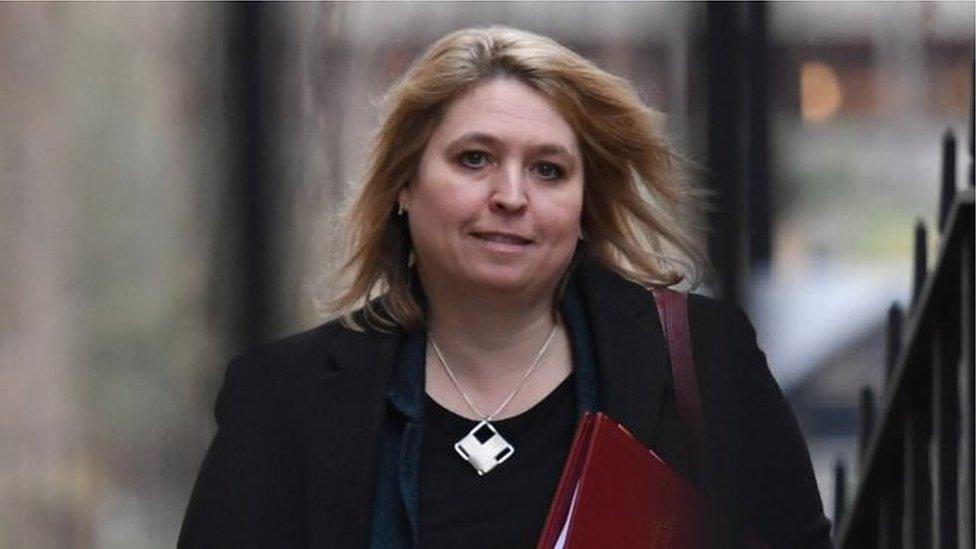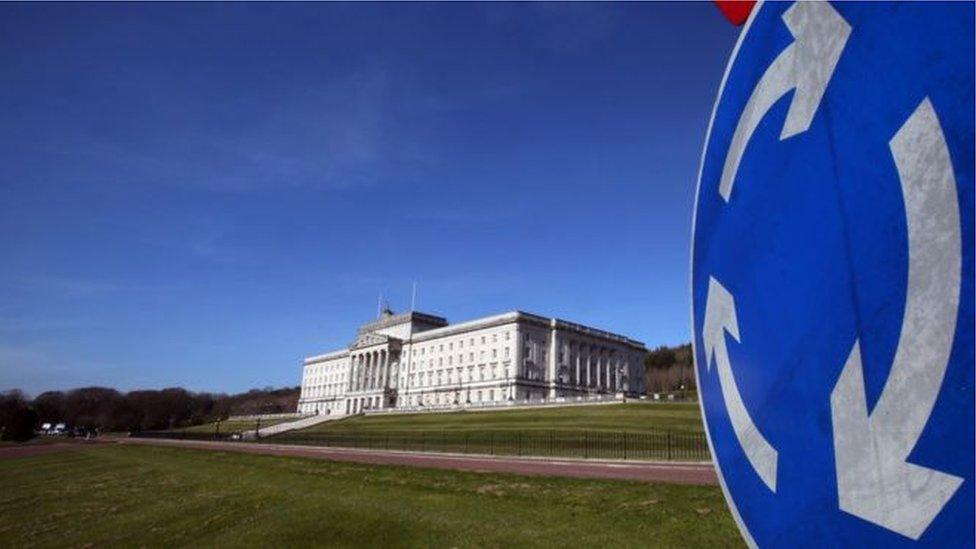Karen Bradley denies dithering over MLA pay
- Published
- comments
People want to see action says Karen Bradley.
The secretary of state has denied dithering over MLAs' pay after the collapse of the Stormont talks.
Karen Bradley, who has the power to vary wages, told MPs on Monday that she was minded to reduce MLAs' pay.
She recognised that people want to see action, she said, adding that she said she would go through the "proper processes".
Last December, former assembly Chief Executive Trevor Reaney recommended a cut of 27.5%.
Mrs Bradley said she wants to hear from Northern Ireland's political parties before making a final decision.
As things stand, MLAs' annual salaries will rise from £49,500 to £50,000 on 1 April.
Northern Ireland has been without a functioning executive since January 2017.
Asked whether she was considering the creation of an interim Assembly, she said a number of local parties had put forward suggestions about what could be done to provide extra scrutiny of decisions and that she was looking at all the ideas.
The secretary of state added that whatever she does will not undermine the 1998 Belfast Agreement or create an obstacle to the return of the Executive, but would rather enjoy cross-community approval.
She recognises people are frustrated about the current deadlock and want immediate decisions, but said they do not want a development which might make it impossible in the future to secure the return of devolved government.

Karen Bradley told the House of Commons on Monday she was minded to reduce MLAs' pay
Mrs Bradley denied that the current position amounts to direct rule, but said she needed to pass a budget last week in order to enable public services to function properly.
She said she would launch a consultation on proposed new legacy institutions shortly and was getting legal advice on the implications of a recent court ruling that withholding funding for legacy inquests is not lawful.
'Get on with it'
Alliance Party leader Naomi Long reiterated her party's position that MLAs should face a pay cut in the absence of a functioning executive.

Northern Ireland has been without a devolved government since January 2017
"We have said that if the Assembly wasn't restored in the time limit we should have MLA pay reduced, not because we aren't working - because we are - but because we're not doing the whole job and it's not sustainable," she told BBC Radio Ulster's Good Morning Ulster programme.
Mrs Bradley needed to make the decisions and "get on with it", she added.
"I wrote to the secretary of state when the talks collapsed and one of the key things I told her I thought needed to happen was reduced MLA pay so she knows where we stand," she added.
Voluntary coalition
Steve Aiken from the Ulster Unionist Party (UUP) also said decisions needed to be made.
He said: "No MLA would willingly say: 'It's now time to cut our pay.'
"But the Reaney report has been made... We need to look at alternatives like a voluntary coalition - we need to move on."
SDLP Deputy Leader Nicola Mallon said Mrs Bradley had "ducked a number of difficult decisions".
"Regrettably what we saw yesterday was another vague statement from a secretary of state talking about remaining steadfast and their commitment to the Good Friday Agreement but with no detail about how that's going to happen," she told the programme.
Mrs Bradley is travelling to Washington later this week to attend the US St Patrick's Day celebrations.
She plans to have discussions there with the chairwoman of the Policing Board Anne Connolly, who has complained about the impact the Stormont deadlock on the accountability of the PSNI.
- Published13 March 2018